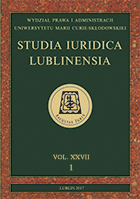The Concept of Stare Decisis in the German Legal System – A Systematically Inconsistent Concept with High Factual Importance
The Concept of Stare Decisis in the German Legal System – A Systematically Inconsistent Concept with High Factual Importance
Author(s): Peter Stainer, Dominik KönigSubject(s): Criminal Law, Civil Law, EU-Legislation
Published by: Wydawnictwo Naukowe Uniwersytetu Marii Curie-Sklodowskiej
Keywords: stare decisis; precedent; German legal system; Federal Constitutional Court;
Summary/Abstract: It is worth mentioning that the German legal system is based on the codified law. This system lacks in stare decisis and precedents in general, which – in principle – does not raise doubts. The role of precedent in the decisional process is relative and dependent on the question as to whether the case may be resolved pursuant to a legal act. In that case, precedents would not play any or almost any role at all. However, the role of precedents increases, when there is a lack of appropriate legal rights, or if legal rights require interpretation. It should be emphasised that stare decisis understood as a formally binding precedent refers only to rulings issued by the Federal Constitutional Court, whereas precedents of higher courts have a significant meaning to everyday judicial practice in Germany, despite the fact that they are not formally binding.
Journal: Studia Iuridica Lublinensia
- Issue Year: 27/2018
- Issue No: 1
- Page Range: 121-130
- Page Count: 10
- Language: English

